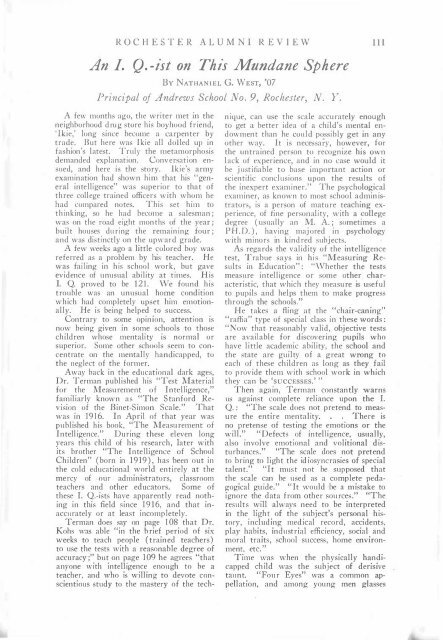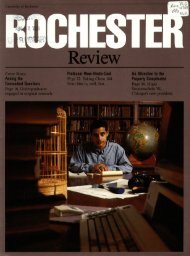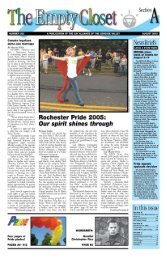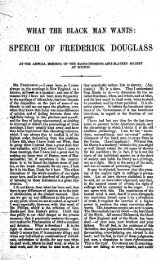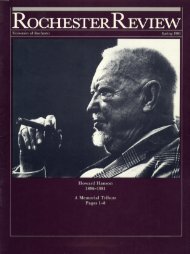Download PDF - University of Rochester Libraries
Download PDF - University of Rochester Libraries
Download PDF - University of Rochester Libraries
You also want an ePaper? Increase the reach of your titles
YUMPU automatically turns print PDFs into web optimized ePapers that Google loves.
ROCHESTER ALUMNI REVIEW 111<br />
An 1. Q.-ist on Th is Mundane Sp here<br />
By NATHANIEL G. WEST, '07<br />
Principal <strong>of</strong> Andrews School No. 9, <strong>Rochester</strong>, N. Y.<br />
A few months ago, the writer met in the<br />
neighborhood drug store his boyhood friend,<br />
'lkie,' long since become a ca rpenter by<br />
trade. But here was lkie all dolled up in<br />
fashion 's latest. Truly the metamorphosis<br />
demanded explanation. Conversation ensued,<br />
and here is the story. lkie 's army<br />
examination had shown him that his "general<br />
intelligence" was superior to that <strong>of</strong><br />
three college trained <strong>of</strong>ficers with whom he<br />
had compared notes. This set him to<br />
thinking, so he had become a salesman ;<br />
was on the road eight months <strong>of</strong> the year ;<br />
built houses du ring the remaining four ;<br />
and was distinctly on the upward grade.<br />
A few weeks ago a little colored boy was<br />
referred as a problem by his teacher. He<br />
was failing in his school wo rk, bu t gave<br />
evidence <strong>of</strong> u nusual ability at times. His<br />
1. Q. proved to be 121. We fou n d his<br />
t rouble was an unusual home cond ition<br />
which had completely upset him emotionally.<br />
He is being helped to success.<br />
Contrary to some opinion, attention is<br />
now being given in some schools to those<br />
children whose mentality is normal or<br />
superior. Some other schools seem to concentrate<br />
on the mentally handicapped, to<br />
the neglect <strong>of</strong> the former.<br />
Away back in the educational dark ages,<br />
Dr. Terman published h is "Test Material<br />
for the Measurement <strong>of</strong> Intelligence,"<br />
famil iarly known as "The Stanford Revision<br />
<strong>of</strong> th e Binet-Simon Scale." That<br />
was in 1916. In Ap ril <strong>of</strong> that year was<br />
publ ished his book, "The Measu rement <strong>of</strong><br />
Intelligence." During these el even long<br />
years this child <strong>of</strong> his research, later with<br />
its brother "The Intelligence <strong>of</strong> 'School<br />
Children" (born in 1919), h as been out in<br />
the cold education al world ent irely at the<br />
mercy <strong>of</strong> our administrators, classroom<br />
teachers and other educators. Some <strong>of</strong><br />
these I. Q.-ists have apparently read nothing<br />
in this field since 1916, and that inaccu<br />
rately or at least incomp letely.<br />
Terman does say on page 108 that Dr.<br />
Kohs was able "in the brief period <strong>of</strong> six<br />
weeks to teach people ( trained teachers )<br />
to use the tests with a reasonable degree <strong>of</strong><br />
accuracy ;" but on page 1 09 'h e agrees "that<br />
anyone with intelligence enough to be a<br />
teacher, and who is willin g to devote conscientious<br />
study to the mastery <strong>of</strong> the tech-<br />
nique, can use the scale accurately enough<br />
to get a better idea <strong>of</strong> a child's mental end<br />
owmen t than he could possibly get in any<br />
other way. It is necessary, however, for<br />
the untrained person to recognize his own<br />
lack <strong>of</strong> experience, and in no case would it<br />
be j ustiliable to base import an t action or<br />
scientific conclusions upon the results <strong>of</strong><br />
the inexpert examiner." The psychological<br />
exam iner, as known to most school administrators,<br />
is a person <strong>of</strong> mature teaching experience,<br />
<strong>of</strong> fine person ality, with a college<br />
degree (usually an M. A. ; sometimes a<br />
PH. D. ), having maj ored in psychology<br />
with minors in kind red subjects.<br />
As regards the validity <strong>of</strong> the intelligence<br />
test, Trabue says in his "Measuring Results<br />
in Education": " Wh ether the tests<br />
measu re intell igence or som e other characterist<br />
ic, that which they measu re is useful<br />
to pupils and helps them to make progress<br />
through the schools."<br />
He takes a Ring at the "chair-caning"<br />
" raffia" type <strong>of</strong> special class in these words :<br />
"Now that reason ably valid, dbjective tests<br />
a re available for discov ering pupils who<br />
have little academic ability, the school and<br />
the state are guilty <strong>of</strong> a great wrong to<br />
each <strong>of</strong> these chil d ren as long as they fail<br />
to p rov ide them with school work in wh ich<br />
' "<br />
they ca n 'be 's UCCESSES.<br />
Then again , Terman constan tly warns<br />
us against complete reli ance upon the I.<br />
Q. : "The scale does not pretend to measure<br />
the entire mentality. There is<br />
no pretense <strong>of</strong> testing the emotions or the<br />
will . " "Defects <strong>of</strong> intelligence, usually,<br />
also involve emotional and volitional distu<br />
rbances." "The scale does not pretend<br />
to bring to light the id iosyncrasies <strong>of</strong> special<br />
talent." "It must n ot be sup posed that<br />
the scale can be used as a complete pedagogical<br />
gu ide." "It wou ld be a mistake to<br />
ignore the data from other sou rces." "The<br />
resul ts will always need to be in terpreted<br />
in the light <strong>of</strong> the subject's personal history,<br />
including medical record, accidents,<br />
play habits, industrial efficiency, social and<br />
moral traits, school success, home environment,<br />
etc. "<br />
Time was when the physical ly handicapped<br />
ch il d was the subject <strong>of</strong> derisive<br />
taunt. "Fou r Eyes" was a common appell<br />
ation , and amon g young men glasses


